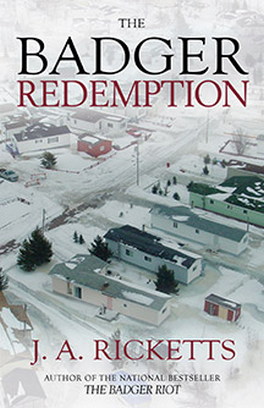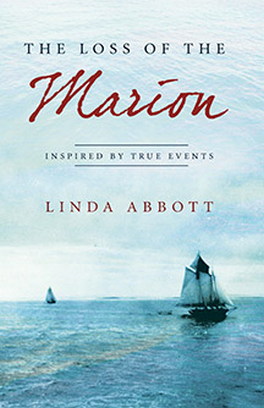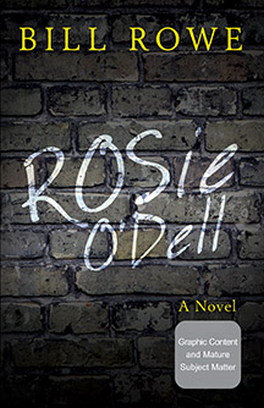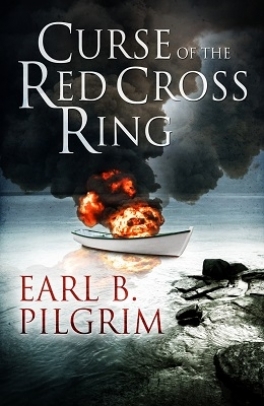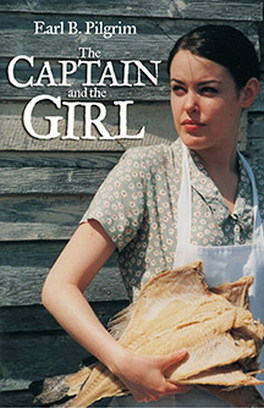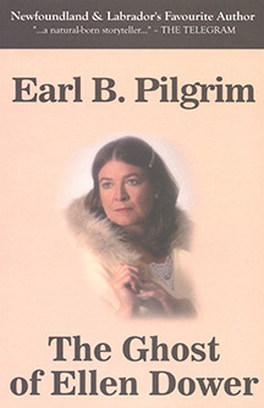Who says you can't go home again? Sylvia can’t imagine why anyone would ever try. She had left rural Newfoundland as a scrawny, shy girl who was too smart for her own good. When she dragged herself home for her cousin’s wedding, she couldn’t believe how much had changed—or how much had stayed the same. Ten years older but no less fixated on an exit strategy, Sylvia returns to confront the person she left behind: her younger self. When she left, she was Miss Sylvia Pride, a fisherman’s daughter without an education, money, or any sophistication. Returning now, she is a different person. Whether she wants to or not, Sylvia reconnects with her long-lost best friend. While they are unpacking things left unsaid for years, Sylvia’s life gets more complicated when her husband arrives from Boston. Surrounded by the successful families in her hometown, and with her own marriage on the brink of collapse, Sylvia finds herself at a crossroads. Is there such a thing as happily ever after? And can the family and friends she left behind now help her find it? The People Who Stay is a tale of love and redemption in which the heart of family beats like the relentless tide against the rugged Newfoundland shores. Long listed for the Miramichi Reader The Very Best! Book Awards 2016
There were no detours or pit stops available. No oops-wrong-turns. Sylvia’s shiny silver rental car stumbled over potholes without losing speed. The weathered pavement, laid in 1978 and repaired just twice since, offered no other options. She was going nowhere but home.
She was in no hurry to get there, but Sylvia reminded herself that the sooner her stay began, the sooner it would end.
She slowed when she got to the painted sign welcoming her to Cuddlesville. The name, endearing as it seemed to people on the outside, felt painfully jejune to Sylvia now. It was like a joke that went on too long for people to remember that it was only a joke. Little Heart’s Ease, Come By Chance, Paradise: it was as if Newfoundland communities had been named by a band of ten-year-old girls.
Sylvia wished she had remembered to bring a CD as the musical stylings of 620AM echoed throughout the car. The radio droned about the sharp knife of a short life and what the singer would do if she died young. All it seemed to do was remind Sylvia of the number thirty barrelling toward her. Her hometown had that effect on her—with or without the country lyrics as a catalyst.
People somehow aged faster there. When Sylvia arrived, it was as if she had never left, as if she had spent the last ten years in that age pressure cooker.
When the trees broke, giving way to the sparse spread of houses, Sylvia couldn’t help but feel a twinge of nostalgia. Trails of smoke drifted from chimneys into the overcast sky, despite calendars already being turned to June.
Yesterday it had been twenty-two degrees in Gander, someone had been boasting at the arrival gate. Stepping outside the airport, Sylvia’s hopes of similar temperatures were erased by the cold air biting into her. Steam flooded out of her mouth when she exhaled a deep breath of fresh Newfoundland air. Her visible breath coupled with the chimney smoke dancing up into the clouds both promised that she wouldn’t have a warm day today. Maybe tomorrow.
The weather swung around as randomly as the numbers selected for radio bingo, which she could still recall watching her grandparents play. Her grandfather, rest his soul, always complained that the numbers were rigged. Perhaps the weather was more random than radio bingo numbers.
Driving through the tiny town caused a flooding of memories. Everything, frozen in time, set the scene for a retrospective drive through her childhood.
There was the church where she had said goodbye to her grandfather. She averted her eyes from the cemetery peeking out from behind the church, but it was no use. When she thought of her grandfather, she couldn’t help but remember his funeral. It had been her first.
Hymns had fallen on the crunchy snow. Sylvia had not been singing along. Even a sombre song seemed out of place in her mouth on such a dark day. The air was crisp. It was so cold you could almost feel it, as though the temperature were a tangible thing.
Charlie held Sylvia’s hand. Even without her mittens, Sylvia’s hand had not made the retreat into her flannel-lined pockets. She would not forgo Charlie’s comfort.
Charlie watched the others, the adults. The funeral was the first for her, too.
Patrons filed out of the cemetery, ushering themselves into the warmth of their cars. Charlie watched her mother hugging Sylvia’s mother. She watched them weep. Even though Sylvia wasn’t crying, Charlie let teardrops wet her eyelashes. Charlie walked slowly beside Sylvia, her eyes analyzing the adults for cues. She whipped her long blonde braid behind her and compassionately pulled Sylvia under her arm as they exited the cemetery. Charlie, who still had all four of her grandparents intact, was filled with empathy for her best friend as they abandoned Sylvia’s grandfather in the cold prison with all the other dead loved ones.
Grateful to have that sad memory overshadowed by a happier one, Sylvia drove past the wharf. A smile spread the wrinkles out of Sylvia’s pursed lips. She didn’t smile a lot, not anymore, but the wharf reminded Sylvia of an old smile. She remembered Charlie pushing Drew over the edge into the icy water. Sylvia forgot the details of the fight. Those two were always in a fight. All Sylvia could remember now was that ceremonious splash.
They had since married. Not just married, but married one another. Despite all the stubborn fights, everyone knew they would be married sooner or later. They had four children, at last tally. Sylvia felt a subtle stirring of regret in the pit of her stomach, recalling how she had opted to stay in Boston the weekend of their wedding. It was a slapped-together affair, and there was little notice. Sylvia was defending her master’s thesis the following Monday. It couldn’t be done. She couldn’t be there to see Charlie Sheppard, the blushing bride, take Andrew Power in holy matrimony.
Perhaps she could have made a way to attend. It was not as though she was opposed to the wedding.
Sylvia was born with an inherent understanding that she and Charlie would be best friends, just like their mothers before them. Sylvia wanted what was best for her friend, and she couldn’t imagine a better man for Charlie than Drew. Sylvia and Drew had been as close as she and Charlie while they were growing up.
Yet she had not made it home for their wedding.
Even good memories were tainted by what Sylvia had made of things. Maybe that was why she let so much time lapse between visits.
It was always too long since she had been home, always a guilt trip.
Her parents had come to Boston for Christmas once. They didn’t like it there any more than Sylvia liked her visits to Newfoundland.
Sylvia’s rental car slowed even more as she rolled up her old lane.
She remembered walking home from the bus stop after school. For no good reason, she thought about the time the strap of her brand new Pocahontas backpack broke. She cried more about that broken backpack strap than she had at her grandfather’s funeral, not because she loved the backpack more, just because she was younger, more affected by such disappointments. Tears had emblazoned zigzagging trails down her cheeks, and she clasped the broken strap tightly in her tiny hand as she towed her belongings home.
She didn’t feel too differently now.
Sylvia shut the rental car off beside the modest house at the end of the lane. The local siding looked as if it had just received a fresh coat of paint. Even the black shutters bore the vibrancy of fresh paint, if the colour black can be vibrant. She pulled the key from the ignition and looked around the clean interior of the car, stalling for time.
Her footsteps creaked on the tired stairs as she made her way in. The door was ajar, welcoming her home.
“Hello,” Sylvia called. “Anybody here?”
“Sylvia?” her mother’s voice echoed upstairs.
Sylvia slid out of the high heels she had not meant to travel in as her mother thudded down the stairs. Her wet hair was swept up on top of her head in a pink towel. Then the rapid-fire questions and accusations ensued.
How did you get here?
We were going to pick you up.
You didn’t rent a car. Can’t believe you rented a car.
Where’s Tyler?
I thought you had to work. Work, work, work, it’s all the two of you minds.
Wonders why I got no grandchildren.
“Are you complaining because I took an earlier flight?” Sylvia asked when she found a break in her mother’s barrage of words.
Susan pulled her daughter into an aggressively affectionate hug.
“Of course not! Now, let’s get you some food. I knows what Air Canada is like. I suppose you had a bag o’ corn chips all day. By the looks of you, you mightn’t have ate more than that all week.”
Sylvia sat at the kitchen table with her mother buzzing around behind her and watched a boat in the distance making its way in the harbour. She was still queasy from all the up-downs involved in the numerous connections necessary to travel from Boston to Gander. She just didn’t have the stomach to eat. Of course, she didn’t have the heart to tell her mother that.
Sylvia was unscrewing a mason jar of strawberry-rhubarb jam to wipe over her cream crackers when her mother noticed her vacant ring finger. Susan turned ghostly white.
“Oh my God, you’ve left him.”
“What? Oh. No, I just took my rings off for the flights. My fingers swell when I fly. They’re in my purse.”
“Oh, phewf! How’s Tyler, anyways? I was talking to him, when was it? Last week sometime. Last time I called you. You were at the lab. Imagine that. He’s such a sweet boy.”
“Mom, he is thirty-four. I think it may be a stretch to classify him as a boy at this stage.”
“You know what I mean. He’s a nice man, if that suits you. He doesn’t have much to say. Serious as they come. But you can just tell he’s got a good heart.”
“Yeah,” Sylvia said, without looking up. “I like to think so.”
Sylvia popped the top off the jar. She stopped.
“Mom . . .”
“Yes?”
“I think I may be a little sick, perhaps some lingering motion sickness.”
“Do you want some tea? I got the kettle on, anyways. Some soda crackers? Crackers do wonders on a bad stomach.”
“Would you mind if I just go lie down awhile?”
“Course not.”
When Sylvia rounded the corner, Susan crossed her fingers and hopped up and down mouthing, Morning sickness, morning sickness! Please Lord, let it be morning sickness!
Trophies and medals lined every ledge of her old bedroom. The walls still wore horrendous orange floral wallpaper. The thin orange curtains pulled across the window gave the room an eerie, soft orange glow.
Her bedroom had not changed in all the years she had been gone. She wasn’t sure why she expected it to change; probably just because everything else did.
She once overheard one of her students saying that his mother had turned his bedroom into a home gym the week after he moved out for college. When he returned for the summer, he had to sleep on a wiry couch in the basement.
That had not been the case for Sylvia. Her room was like an exhibit at a museum. It waited for her as though she had just left for school and would be back at 3:15.
She lay on her lumpy twin bed and pulled a single patchwork quilt over her shoulders. The quilt was cold. Her science fair trophies seemed to lean in toward her. The familiar smell of her mother’s powdered laundry detergent caused another wave of nostalgia to wash over Sylvia as she pulled the quilt over her head. It wasn’t the light that bothered her. She wanted to shield her eyes from the promising future closing in around her.
How many times had she explained that she was a doctor, but not a medical doctor? How long before her own accomplishments meant anything to anyone? She didn’t care until it was tossed in her face, which was often the case when she was home-sweet-home.
“Touch this,” Darlene had instructed during her last visit, grabbing Sylvia’s hand and placing it on her rib cage. “Feels weird, don’t it? What do you think that is? Not good, is it?”
“I’m not that kind of doctor.”
Even her Aunt Sandy, who was sure she knew everything, had called to inquire about a set of ailments.
“I’m not that kind of doctor, Aunt Sandy.”
“Sylvia,” she said in a hushed voice, “I’ve got my friends over. I told them my niece was a doctor. What am I supposed to tell them now?”
“Tell them I’m not that kind of doctor.”
“B’y, even Dr. Cooper knew what to do about stuff like that. He wasn’t a special doctor.”
“I’m not a medical doctor.”
“Oh.”
They didn’t understand. No one understood. The only person Sylvia had ever been able to commiserate with had been Charlie. Charlie: her best friend, confidante, her other half for the biggest part of her life. But it had been years since they had even spoken. They were bound together now only by Christmas card pictures and infrequent emails. Sylvia knew Charlie was still living there, married to Drew, with a house full of kids, but that was it.
“We won’t have anything to talk about now,” Sylvia explained to her mother that night when she emerged from her bedroom.
“Go on! You and Charlie was like two peas in a pod when you were girls. Couldn’t peel you apart. I don’t know whatever happened between you two.”
Sylvia shrugged,
“We just grew apart. People change.”
The People Who Stay is a thoroughly enjoyable, stimulating and insightful read.-- The Miramichi Reader --
The People Who Stay is a delightful read. Samantha Rideout does a remarkable job capturing the breathtaking beauty of some of Newfoundland’s small towns.-- Edwards Book Club --
’The People Who Stay’ is a lovely and loving tribute to the people of rural Newfoundland – those who stay, those who left and those who leave a piece of their hearts behind.-- Northeast Avalon Times --
In The People Who Stay, Samantha Rideout gives us an in-depth and personal look at a question on many young people’s minds in these modern times: do I stay or do I go?-- Atlantic Books Today --














